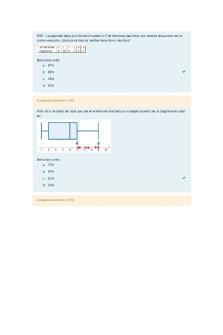(R) P270 9:27 Are Economists Basically Immoral PDF

| Title | (R) P270 9:27 Are Economists Basically Immoral |
|---|---|
| Course | Introduction to Political Economy |
| Institution | University of Washington |
| Pages | 2 |
| File Size | 30.7 KB |
| File Type | |
| Total Downloads | 64 |
| Total Views | 139 |
Summary
Prof Gill...
Description
(R) P270 9/27 Are Economists Basically Immoral? ISSUE ● The issue being investigated by this article is how the perspectives
of an economist are frequently viewed as “immoral” by the general public, which the author claims is in error in three ways.
RULE !. “Risk and Choice.” Here the author states that “victims” of seemingly unfair labor/trade arrangements make the cost-benefit analysis of choosing the best option for them, which is labor. #. “Intentions vs. Consequences.” Author states here that there are consequences to actions and policies (?) that might not be intended… Author says people criticize the work of economists for assuming an uncontrollable system? $. “Face to Face vs Commercial Society.” In a nutshell, the author argues that a commercial society cannot operate with the rules of a family. While the public feels that the familial structure of selfsacrifice is a good framework to follow, in reality, I guess it just doesnʼt and cannot work that way. Society is just impersonal. %. “Interests and Incentives.” The author argues that there is rarely outright evil interests/incentives. Most of it is just self-seeking, “it is an economic problem much more than it is a moral problem.” Is the author just saying that everyone is just seeking their own interests and are motivated by incentives (economic?). Rarely are there just malevolent people out to hurt others.
ANALYSIS ● With this viewpoint of economics being a more scientific study of
costs and benefits and what motivates people, I think that the author is perhaps pushing for a more analytical view of why people make certain choices and what politics is motivated by. In a ways, I think the author is pushing for the idea that there doesnʼt have to be “limitations” on what sort of policies we are going for? Like, I think that the author is rationalizing things within a very theoretical framework of costs and benefits and trade-offs.
CONCLUSION ● What is the main argument?...
Similar Free PDFs

Economists as policy advisers
- 2 Pages

Why Abortion is Immoral Article
- 21 Pages

Gage R&R ejemplo - G R&R
- 23 Pages

R
- 1 Pages

R
- 17 Pages

R&R - Chapter 2
- 7 Pages

R Spanish - lenguaje r
- 1 Pages

TEST R - TEST R
- 32 Pages

R&R reading notes
- 47 Pages

Instala R - apuntes r
- 5 Pages

Tarea 6 R&R
- 1 Pages
Popular Institutions
- Tinajero National High School - Annex
- Politeknik Caltex Riau
- Yokohama City University
- SGT University
- University of Al-Qadisiyah
- Divine Word College of Vigan
- Techniek College Rotterdam
- Universidade de Santiago
- Universiti Teknologi MARA Cawangan Johor Kampus Pasir Gudang
- Poltekkes Kemenkes Yogyakarta
- Baguio City National High School
- Colegio san marcos
- preparatoria uno
- Centro de Bachillerato Tecnológico Industrial y de Servicios No. 107
- Dalian Maritime University
- Quang Trung Secondary School
- Colegio Tecnológico en Informática
- Corporación Regional de Educación Superior
- Grupo CEDVA
- Dar Al Uloom University
- Centro de Estudios Preuniversitarios de la Universidad Nacional de Ingeniería
- 上智大学
- Aakash International School, Nuna Majara
- San Felipe Neri Catholic School
- Kang Chiao International School - New Taipei City
- Misamis Occidental National High School
- Institución Educativa Escuela Normal Juan Ladrilleros
- Kolehiyo ng Pantukan
- Batanes State College
- Instituto Continental
- Sekolah Menengah Kejuruan Kesehatan Kaltara (Tarakan)
- Colegio de La Inmaculada Concepcion - Cebu




